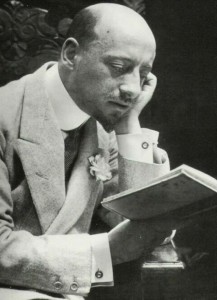
Outwardly so exquisite, the picture of composed contemplation, inwardly lusting for war, power, and slaughter.
Gabriele D’Annunzio: Poet, Seducer, And Preacher Of War. Lucy Hughes-Hallett. 543 pp., Anchor Books.
I reluctantly confess that during my late teens I underwent a decadent period. Please don’t think I lolled on a chaise lounge in a cork lined room, smoking opium while dressed in red satin. Those resources weren’t available to me at sixteen. No, I just read books by and about people like Beardsley, Wilde, and Max Beerbohm. One of the most intriguing figures I learned about was the Italian poet, playwright, and novelist D’Annunzio. Cursory accounts made him out as an extravagant, strutting peacock of a literary figure, even by 19th Century standards. Sadly, like a literary weakling, I never read his stuff, one, because his works weren’t readily available in that distant, pre-Internet age, and two, it sounded daunting.
The Internet and renewed interest led me to this thoroughly entertaining, but still comprehensive biography of the Vate, Italy’s self styled Bard. Many literary bios can be slow going, since authors must spend long hours alone at work. That certainly can’t be said for D’Annunzio. An Italian Everready Bunny, Gabe had energy to burn all through his life (although considerably aided toward the end by heavy doses of cocaine). While most writers would be content to generate a decent body of work while somehow keeping body and soul together, D’Annunzio churned out poetry and prose at an astonishing rate while living in sybaritic luxury that would have put the Borgias to shame, and always on somebody else’s dime too.
A half baked runt, bald by age 23, D’Annunzio nonetheless cruised through life with the secure self-assurance of a pampered, favorite son. His first book of poetry was a vanity affair, published at his father’s expense, but cunningly advanced by D’Annunzio’s contacts and, most prominently, a rumor deliberately spread by the author of his death while out riding, a young poet’s life tragically cut short. This demonstrated D’Annunzio’s flair for public relations, a gift he never lost throughout his long career. He was one of the first writers to be just as notorious for his antics (in and out of bed) as for his work.
On the positive side, D’Annunzio has to be given credit for work ethic. He wrote like his ass was on fire, an almost continuous stream of prose and poetry with rare, intermittent interruptions. D’Annunzio was also a true devotee of the poet’s creed, someone who studied and worked continuously to learn his craft. He showed physical courage, a fearless horseman to the point of recklessness, and most notably, in his hair brained, near suicidal military stunts during WWI.
On the negative side, D’Annunzio was an absurd spendthrift, determined to live at the height of opulence even though up to his bald scalp in debt. At one point, little D had to flee his creditors in Italy and live in France where he racked up even more debt. His works made money, but he always lived far beyond his means. One mansion after another was acquired and then rebuilt and furnished to suit the poet’s ornate fancies, a voluptuary’s paradise often interrupted by bailiffs come to repossess the furniture or angry scenes by the latest of D’Annunzio’s paramours.
This raises his other notorious character flaw, his incessant womanizing. Even for a stereotypical hot-blooded Latin lover, D’Annunzio sure didn’t bother to keep it in his pants. One woman after another was taken for a ride by the heel, loved and lavished with attention and then kicked to the curb at some point (often after years of his abuse) without a word of explanation (the sensitive poet hated having to say goodbye). The most famous of these quite unpleasant sounding relationships was with the Italian actress Eleonara Duse, as famous in her day as Sarah Bernhardt, now largely forgotten. BDSM fans will enjoy the author’s account of their tortured relationship with La Duse in tears, begging D’Annunzio for forgiveness through a locked door while he savored her misery and wrote down his impressions.
D’Annunzio’s worst trait was his love of war and violence. He wasn’t alone. Late 19th-Century Western European culture was rife with aggressive tendencies as reflected in Nietzsche’s thought and the general glorification of war as a cleansing, renewing phenomenon. D’Annunzio got his chance to put his principles into practice with WWI, a conflict D’Annunzio helped drag Italy into (with many others, including Mussolini), leading to a disastrous war with half a million Italian dead and literally almost nothing gained at the end. Heedless of consequences to others as always, D’Annunzio threw himself into the war. He endlessly orated at the front, glorifying death in battle. He put himself at risk too, participating in daring air and sea raids. In one bombing mission, he was hit by a machine gun so badly, D’Annunzio was blinded in one eye.
War ended for Italy in a Pyrrhic victory. Discontented, angry veterans raged against the politicians who had betrayed them. Still lusting for adventure, D’Annunzio embarked on his greatest exploit. At the head of a ragtag group of fanatics, he seized control of the port of Fiume, now Rijeka in Croatia. What followed was a bizarre, sinister episode in political history, the strange pseudo-state that D’Annunzio briefly ruled over. The book is worth reading alone for Hughes-Hallett’s account of this unmitigated nut festival. While D’Annunzio’s quixotic venture ended in predictable fiasco, as Hughes-Hallett notes, the experience provided a template for Mussolini’s subsequent seizure of power and creation of a Fascist state. This leads to my chief score against D’Annunzio, his role in devising a noxious, antidemocratic doctrine.
Once Mussolini came to power, D’Annunzio retreated to his last sanctuary, the Vittoriale, a still existing estate that sounds like the Italian equivalent of the Winchester Mansion. Kept by the suspicious Mussolini in a state of undeclared house arrest, D’Annunzio continued to write and indulge his senses through sex, music, drugs, and whatever else struck his fancy. Pictures of him in old age show a tiny figure with a completely shaven head in a comic opera uniform, complete to ridiculous dagger. A tough old bird, D’Annunzio even lived through a serious fall where he landed on his head, and died at 73, pen in hand, at his desk.
I recommend this book to anyone interested in European history, European literature, Italian history, WWI, fascism, and anyone who wants to read about a really entertaining jerk.
https://www.penguinrandomhouse.com/books/84061/gabriele-dannunzio-by-lucy-hughes-hallett/
This is a link to the Vittoriale’s foundation, in English:



